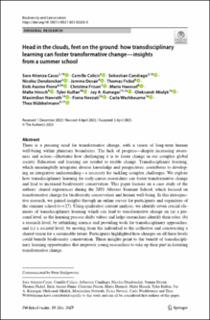| dc.contributor.author | Nawrath, Maximilian | |
| dc.contributor.author | Atienza Casas, Sara | |
| dc.contributor.author | Calicis, Camille | |
| dc.contributor.author | Candiago, Sebastian | |
| dc.contributor.author | Dendoncker, Nicoloas | |
| dc.contributor.author | Desair, Jomme | |
| dc.contributor.author | Fickel, Thomas | |
| dc.contributor.author | Finne, Eirik Aasmo | |
| dc.contributor.author | Frison, Christine | |
| dc.contributor.author | Haensel, Maria | |
| dc.contributor.author | Hinsch, Malte | |
| dc.contributor.author | Kulfan, Tyler | |
| dc.contributor.author | A. Kumagai, Joy | |
| dc.contributor.author | Mialyk, Oleksandr | |
| dc.contributor.author | Nevzati, Fiona | |
| dc.contributor.author | Washbourne, Carla | |
| dc.contributor.author | Wübbelmann, Thea | |
| dc.date.accessioned | 2023-05-26T12:38:34Z | |
| dc.date.available | 2023-05-26T12:38:34Z | |
| dc.date.created | 2023-05-25T16:19:08Z | |
| dc.date.issued | 2023 | |
| dc.identifier.citation | Biodiversity and Conservation. 2023. | en_US |
| dc.identifier.issn | 0960-3115 | |
| dc.identifier.uri | https://hdl.handle.net/11250/3069172 | |
| dc.description.abstract | There is a pressing need for transformative change, with a vision of long-term human well-being within planetary boundaries. The lack of progress—despite increasing awareness and action—illustrates how challenging it is to foster change in our complex global society. Education and learning are needed to enable change. Transdisciplinary learning, which meaningfully integrates diverse knowledge and perspectives, contributes to developing an integrative understanding—a necessity for tackling complex challenges. We explore how transdisciplinary learning for early-career researchers can foster transformative change and lead to increased biodiversity conservation. This paper focuses on a case study of the authors’ shared experiences during the 2021 Alternet Summer School, which focused on transformative change for biodiversity conservation and human well-being. In this introspective research, we gained insights through an online survey for participants and organizers of the summer school (n = 27). Using qualitative content analysis, we identify seven crucial elements of transdisciplinary learning which can lead to transformative change on (a) a personal level, as the learning process shifts values and helps researchers identify their roles; (b) a research level, by rethinking science and providing tools for transdisciplinary approaches, and (c) a societal level, by moving from the individual to the collective and constructing a shared vision for a sustainable future. Participants highlighted how changes on all these levels could benefit biodiversity conservation. These insights point to the benefit of transdisciplinary learning opportunities that empower young researchers to take up their part in fostering transformative change. | en_US |
| dc.language.iso | eng | en_US |
| dc.publisher | Springer | en_US |
| dc.rights | Navngivelse 4.0 Internasjonal | * |
| dc.rights.uri | http://creativecommons.org/licenses/by/4.0/deed.no | * |
| dc.title | Head in the clouds, feet on the ground: how transdisciplinary learning can foster transformative change—insights from a summer school | en_US |
| dc.type | Journal article | en_US |
| dc.type | Peer reviewed | en_US |
| dc.description.version | publishedVersion | en_US |
| dc.rights.holder | © 2023 The Authors | en_US |
| dc.source.pagenumber | 36 | en_US |
| dc.source.journal | Biodiversity and Conservation | en_US |
| dc.identifier.doi | 10.1007/s10531-023-02603-0 | |
| dc.identifier.cristin | 2149373 | |
| cristin.ispublished | true | |
| cristin.fulltext | original | |
| cristin.qualitycode | 1 | |

